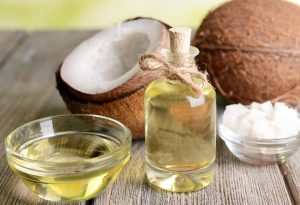In this Article
Coconuts are used traditionally in cooking in most tropical countries. Much hype has been generated on the benefits and risks involved in externally using and consuming coconut milk, coconut oil, and coconut during pregnancy.
Amazing Health Benefits of Eating Coconut During Pregnancy
Each human being’s physical conditions are different. Especially during pregnancy, one needs to eat right. The baby gets nourished depending on what the mother eats. Let’s look at the benefits of using coconut during pregnancy.
- Coconut is rich in dietary fibre, sodium, potassium, calcium, magnesium, minerals, hormones, enzymes etc. Eaten moderately, tender coconuts work to prevent anaemia, urinary tract infections, morning sickness, and swelling in the feet due to poor blood circulation.
- The fats in coconuts are medium-chain triglycerides and are said to help to burn off stored fat in the body. Hence, coconut milk during pregnancy acts as an excellent source of good fat, promoting the growth of a healthy baby and increasing volume of urine and breast milk.
- Coconut oil is obtained from the coconut using a cold-press. Since there is no heating, bleaching, deodorising etc. involved, it is called virgin coconut oil.
- It is used for cooking, skincare, and lubrication, among other things.
- Using coconut oil in pregnancy helps maintain skin elasticity, and prevents belly scarring and itching due to pregnancy. It contains good amounts of Vitamin E and lauric acid, making it the secret recipe for being beautiful throughout and after pregnancy.

- Coconut water is 94% water and fairly low in calories. Drinking coconut water during pregnancy keeps the blood volume regulated, prevents dehydration, tiredness, and nausea, and is very easily digestible and absorbed by the blood.
- Tender coconut works as a laxative and prevents constipation.
- It seems to be a good source of Vitamin B, Potassium, electrolytes, amino acids, plant hormones, and enzymes. It is an antioxidant and is claimed to improve immunity to bacterial infections.
- Skin-tone and elasticity are improved and any itchiness in the skin in taken care of.
- It helps with belly distention, heartburn, and anaemia because of the presence of absorbable iron in it. Anaemia in pregnant women is very common and can have disastrous results for both mother and child.
- Coconut water contains lauric acid, which helps increase the breast milk volume and maintain elasticity in the breasts.
Complications Associated With Consuming Coconut When Pregnant
The use of small amounts of coconut consumed will provide for the growing baby’s health. However, there may be certain complications that you need to consider.
- Prolonged usage of a coconut-rich diet may lead to complications like dyslipidemia in obese women, which causes the cholesterol level to rise.
- Some people could be allergic to pollen and plants from the Arecaceae or Coconut family.
Myths About Coconut Water During Pregnancy
1. Myth: Coconut water makes the baby fairer
Fact: The baby’s skin colour depends on genetic factors only and cannot be altered by the consumption of coconut water or any other food.
2. Myth: Coconut water makes the baby’s hair grow thicker and stronger
Fact: Baby’s hair strength and texture depend on genes and health. Drinking coconut water during pregnancy will not show any impact on the baby’s hair growth.
3. Myth: Coconut water causes acidity
Fact: Coconut water does not cause acidity during pregnancy. Any acidity that you experience is due to the expansion of the belly, which interferes with the digestion process.
Eating coconuts and tender coconut during pregnancy is safe and highly recommended in moderate quantities. Coconut water should be used in moderation and not as a substitute for water, during pregnancy. Discuss the amount you consume and check with your doctor if there are any contraindications.









